Rye Barcott's Blog, page 3
February 2, 2021
Securing More than a Scholarship
Contributions by Nancy Muga | Written by Hannah Bain
Despite mastering her primary school courses, Nancy Muga had to repeat a class before enrolling in secondary school. She did not repeat the class because she needed extra help but rather because her parents needed extra time. They could not afford to support two children through secondary school simultaneously, and Nancy’s older brother had a year left before graduation.
Due to the financial constraints facing her family, Nancy had two options: wait for her brother to graduate from secondary school or secure a scholarship for herself. Strong-willed and determined to continue her education, Nancy applied for funding through CFK’s Angaza Scholarship Project. She received a scholarship in 2015 and immediately enrolled in secondary school.
While the scholarship eased the financial burden on her family, it also provided Nancy with the opportunity to explore career paths and experience personal and professional growth through mentorship and visits to local universities.
“I am very grateful for CFK, and not just for the financial support,” Nancy said. “[Through the Angaza Scholarship Project], we had programs where we were mentored, guided, and taught life skills to help us make the right decisions.”
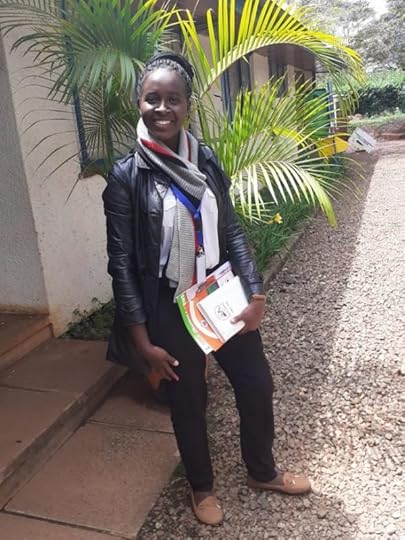 Nancy Muga with some of her school material. (Photo credit: Nancy Muga) Growth Beyond Academics: Service, Skills, and Savings
Nancy Muga with some of her school material. (Photo credit: Nancy Muga) Growth Beyond Academics: Service, Skills, and SavingsLike many young people involved with CFK, Nancy did not participate in just one program. In addition to Angaza, she volunteered at CFK’s Lishe Bora Mtaani Nutrition Centre, which offers an eight–week malnutrition management program for severely malnourished children under five years old. At the nutrition centre, Nancy assisted staff with administrative tasks and helped feed and care for the children.
To fulfill her secondary school Community Social Responsibility requirements, Nancy worked with Joshua Omweno, CFK’s Angaza Scholarship Program Officer, to develop a mentorship program for students who completed their Form 4, grade 12, exams. She and Joshua collaborated on the curriculum, which includes college-related topics such as applying for Kenya Universities and Colleges Central Placement Services (KUCCPS).
After completing secondary school, Nancy continued developing her skills. She joined CFK’s Information and Communications Technology (ICT) training program, where she learned how to skillfully use digital applications such as Microsoft Office.
Inspired and informed by financial literacy classes at the ICT Centre, Nancy and a group of peers founded the Young Billionaires Association to offer credit to youth in Kibera. The group received a grant of 60,000 KES to start the project, and they invested it into various business ventures, such as selling shoes. Nancy and the other group members also received a soft loan from the Kenya Network Marketing Association (KENEMA) and are learning how to manage loan repayments and interest.
“Some of our businesses have made losses, and some have made profits,” Nancy said. “Overall, we have gained real-life skills in budgeting, bookkeeping, and entrepreneurship. The profits we make are saved in our accounts, and I still have my savings with the group.”
Continued Ambition: The Path to International MarketingNancy is currently pursuing her diploma in marketing and is on track to graduate in December 2021, but she initially had an interest in law.
“I was inspired by everything about lawyers, from how they dressed to how they spoke,” Nancy said. “But when I started my diploma in marketing, I realized that it is relevant across many different fields and could allow me to work for a variety of companies.”
Though Nancy is completing her diploma this year, she does not plan to stop there. In 2022, she hopes to start a degree program in either international marketing or law to further develop and tailor her expertise.
“If I decide to continue with marketing, I would like to venture into food companies, the hotel industry, or tourism,” Nancy said. “I have not had a lot of opportunities to leave Kenya, but I love traveling and would love to travel to new places and work with people all over the world.”
While Nancy has invested a great deal of thought into her professional goals, she also hopes to continue giving back to and improving the community where she grew up.
“In the near future, I would like to work with CFK to develop programs that help the community at large,” she said. “I would like to participate in more CFK activities to help the nation, and I am looking forward to a time when girls in Kibera can help generate employment for people in the country.”
Join us in investing in young leaders like Nancy, and learn more about our Education and Livelihoods initiatives.
Stories of Progress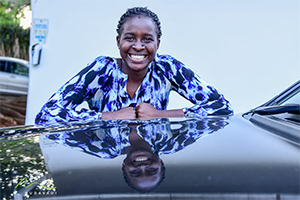 Securing More than a ScholarshipWith her parents unable to financially support two children through secondary school, Nancy Muga had two options: wait for her brother to graduate or secure a scholarship for herself.
Securing More than a ScholarshipWith her parents unable to financially support two children through secondary school, Nancy Muga had two options: wait for her brother to graduate or secure a scholarship for herself.
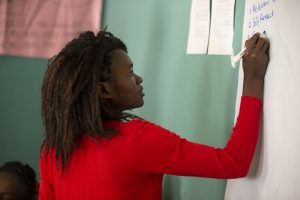 Promoting Healthy Decisions through Counseling and ConnectionsVictrine Oluoch was born to be a counselor. Growing up, she frequently offered advice to her friends, and, after serving as a peer mentor in high school, she recognized that her interest could lead to a purposeful career.
Promoting Healthy Decisions through Counseling and ConnectionsVictrine Oluoch was born to be a counselor. Growing up, she frequently offered advice to her friends, and, after serving as a peer mentor in high school, she recognized that her interest could lead to a purposeful career.
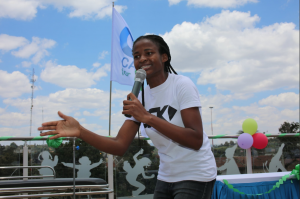 2020 Year in Review: Our Work in PicturesIn 2020, CFK expanded its impact in Kibera, responded to emergency needs created by the COVID-19 pandemic, and celebrated milestones across its programs. Moving forward, CFK seeks to expand its programs and services to additional informal settlements in Kenya.Read more stories
2020 Year in Review: Our Work in PicturesIn 2020, CFK expanded its impact in Kibera, responded to emergency needs created by the COVID-19 pandemic, and celebrated milestones across its programs. Moving forward, CFK seeks to expand its programs and services to additional informal settlements in Kenya.Read more storiesThe post Securing More than a Scholarship appeared first on Carolina for Kibera.
January 11, 2021
Promoting Healthy Decisions through Counseling and Connections
by Victrine Oluoch, CFK Psychological Counselor, and Hannah Bain, CFK Communications Manager
The Story of Victrine OluochVictrine Oluoch was born to be a counselor. Growing up, she frequently offered advice to her friends, and after serving as a peer mentor in high school, she recognized that her interest could lead to a purposeful career.
“I realized I had a passion for helping people make informed decisions and realize their potential,” she said. “As I began researching different career options, I discovered that my passion and personality could be a good fit for work as a counselor.”
Victrine started her career with CFK in 2013. Now, she serves as one of our Psychological Counselors, helping us offer comprehensive counseling services to patients on topics ranging from adolescent and family issues to substance abuse and sexual and gender-based violence.
Victrine once worked with a patient who had been sexually abused throughout much of her childhood but had never discussed her experiences with anyone. After finding support at CFK, the patient decided to start one-on-one counseling sessions with Victrine and eventually shared her story.
“She opened up to me, which was a very brave thing to do,” Victrine said. “She trusted me through the sessions, and she now sees life from a different and more positive perspective. The feeling of taking someone through sessions, helping them have a different perspective in their lives, and hearing them tell you they feel better about themselves and are in a better position to make informed decisions is very fulfilling.”
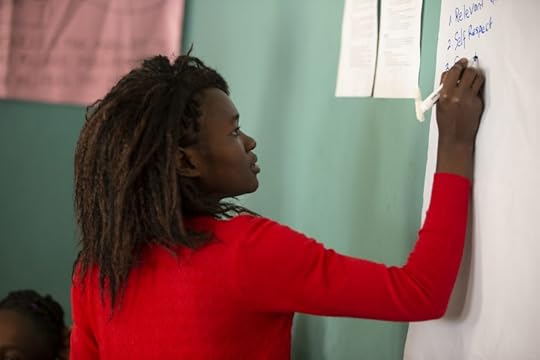 Credit: Andy, 2019. CFK staff lead youth friendly sessions at the Young Health and Wellness Centre. Encouraging Youth Peer-Providers
Credit: Andy, 2019. CFK staff lead youth friendly sessions at the Young Health and Wellness Centre. Encouraging Youth Peer-ProvidersIn addition to providing critical mental health support, Victrine also promotes CFK’s Youth Peer Provider (YPP) strategy. Operated as part of CFK’s Education and Livelihoods Program and implemented through the Young Health and Wellness Centre, the YPP strategy provides young people in Kibera with a unique health information resource– their peers.
Through the YPP model, CFK recruits youth from the community, provides them with accurate information about sexual and reproductive health, and encourages them to share that information with other young people and refer them to CFK programs for additional support. YPPs eventually become “ambassadors” for CFK, connecting with and encouraging other young people in ways that parents, teachers, and adult mentors cannot.
CFK YPPs generally “give their time to the community” for one to two years after they finish high school and before they begin college. Though young people serve as volunteers through the program, they still have to participate in interviews to secure their positions, which provides them with relevant professional development experience for the workplace.
 Credit: Andy, 2019. Youth learn about health and wellbeing at CFK's Young Health and Wellness Centre. Developing a Generation of Mental Health Ambassadors
Credit: Andy, 2019. Youth learn about health and wellbeing at CFK's Young Health and Wellness Centre. Developing a Generation of Mental Health AmbassadorsMost residents in Kibera face multiple stressors on a daily basis, including poverty, food and tenure insecurity, and high rates of violence and disease. Despite these acute levels of stress, mental health support remains virtually nonexistent in the community.
While CFK’s YPP framework has traditionally focused on helping youth make informed decisions about sexual and reproductive health, the program has recently introduced mental health to the curriculum as well. Mental health is still largely misunderstood in Kibera, and uptake of mental health services is slow despite the Young Health and Wellness Centre providing them for free.
“Mental health is quite a new idea in Kenya and Kibera, and most people have not recognized its value,” Victrine explained. “Sometimes, patients don’t understand that they need professional help.”
Equipping the next generation of local leaders with information about mental health, CFK hopes to help normalize the topic so everyone can access the support they need.
Learn more about the connection between physical and mental health, and join us in investing in youth leadership.
Stories of Progress Promoting Healthy Decisions through Counseling and ConnectionsVictrine Oluoch was born to be a counselor. Growing up, she frequently offered advice to her friends, and, after serving as a peer mentor in high school, she recognized that her interest could lead to a purposeful career. by Hannah Bain
Promoting Healthy Decisions through Counseling and ConnectionsVictrine Oluoch was born to be a counselor. Growing up, she frequently offered advice to her friends, and, after serving as a peer mentor in high school, she recognized that her interest could lead to a purposeful career. by Hannah Bain
 2020 Year in Review: Our Work in PicturesIn 2020, CFK expanded its impact in Kibera, responded to emergency needs created by the COVID-19 pandemic, and celebrated milestones across its programs. Moving forward, CFK seeks to expand its programs and services to additional informal settlements in Kenya.by Hannah Bain
2020 Year in Review: Our Work in PicturesIn 2020, CFK expanded its impact in Kibera, responded to emergency needs created by the COVID-19 pandemic, and celebrated milestones across its programs. Moving forward, CFK seeks to expand its programs and services to additional informal settlements in Kenya.by Hannah Bain
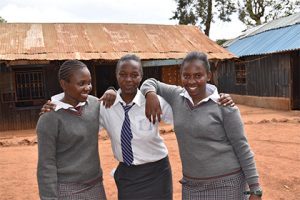 Empowering Girls & Creating Sustainable ImpactRaised in an informal settlement, Sarah Waithera has always been acutely aware of the challenges girls face in disenfranchised communities. Understanding first-hand the threat of gender inequality, she made it her personal mission to work with and empower young girls.by Hannah BainRead more stories
Empowering Girls & Creating Sustainable ImpactRaised in an informal settlement, Sarah Waithera has always been acutely aware of the challenges girls face in disenfranchised communities. Understanding first-hand the threat of gender inequality, she made it her personal mission to work with and empower young girls.by Hannah BainRead more storiesThe post Promoting Healthy Decisions through Counseling and Connections appeared first on Carolina for Kibera.
December 28, 2020
2020 Year in Review: Our Work in Pictures
While 2020 presented the Kibera community with new challenges, CFK staff learned how to do more with less, support one another from a distance, and respond effectively to increased needs. During the COVID-19 pandemic, many of our programs had to adapt to ensure the safety of our staff and beneficiaries, but the foundation of our work remained the same. We continue to engage with the community to improve public health, empower talented young leaders, and promote equal opportunity.
Thanks to our supporters and deep-rooted community ties, 2020 was an opportunity for us to expand our impact in Kibera and beyond. We will build on that momentum in 2021 as we begin extending our programming to additional informal settlements in Kenya.
Primary Healthcare
All four of our healthcare facilities remained open throughout the COVID-19 pandemic, providing critical primary health, maternity, nutrition, and mental health services to community members. CFK also introduced and began operating its first ambulance, providing emergency transportation services throughout the Kibera community.
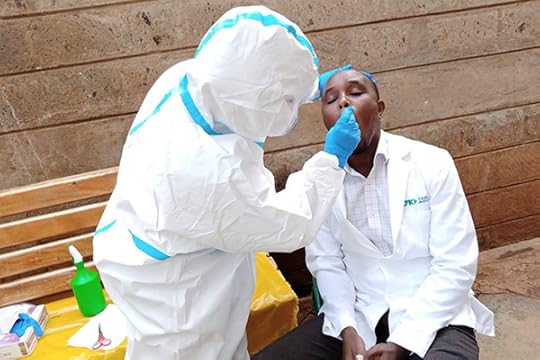 Tabitha Medical Clinic partnered with the Centers for Disease Control and Kenya Medical Research Institute to lead coronavirus sample collection and contact tracing efforts in Kibera. To date, we have collected more than 3,000 samples.
Tabitha Medical Clinic partnered with the Centers for Disease Control and Kenya Medical Research Institute to lead coronavirus sample collection and contact tracing efforts in Kibera. To date, we have collected more than 3,000 samples.  CFK’s team of Community Health Volunteers (CHVs) multiplied the impact of our water, sanitation, and hygiene (WASH) initiatives. Since March, CFK has installed more than 1,500 handwashing stations and distributed more than 15,000 liters of locally made soap.
CFK’s team of Community Health Volunteers (CHVs) multiplied the impact of our water, sanitation, and hygiene (WASH) initiatives. Since March, CFK has installed more than 1,500 handwashing stations and distributed more than 15,000 liters of locally made soap. 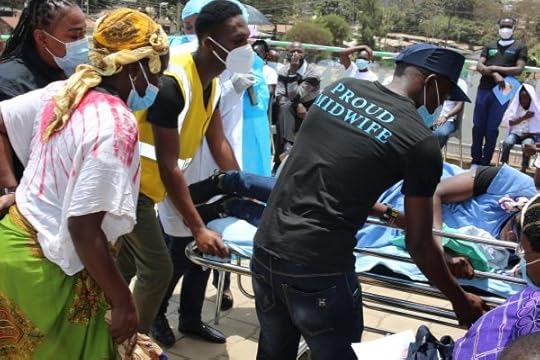 Tabitha Maternity Home celebrated its first anniversary in September 2020, and our team of trained maternity staff delivered 431 children over the course of the year. To date, CFK has recorded zero maternal deaths at the maternity home.
Tabitha Maternity Home celebrated its first anniversary in September 2020, and our team of trained maternity staff delivered 431 children over the course of the year. To date, CFK has recorded zero maternal deaths at the maternity home. The Bill and Melinda Gates Foundation recognized many of our maternity staff as “Frontline Heroes” as part of an inspiring initiative allowing people around the world to express their gratitude to frontline healthcare workers.
The Bill and Melinda Gates Foundation recognized many of our maternity staff as “Frontline Heroes” as part of an inspiring initiative allowing people around the world to express their gratitude to frontline healthcare workers. 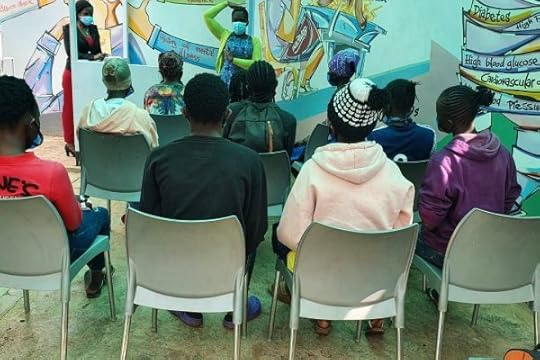 The Young Health and Wellness Centre also celebrated its first anniversary, providing nearly 1,200 youth with services ranging from HIV testing to mental health services since 2019.
The Young Health and Wellness Centre also celebrated its first anniversary, providing nearly 1,200 youth with services ranging from HIV testing to mental health services since 2019. 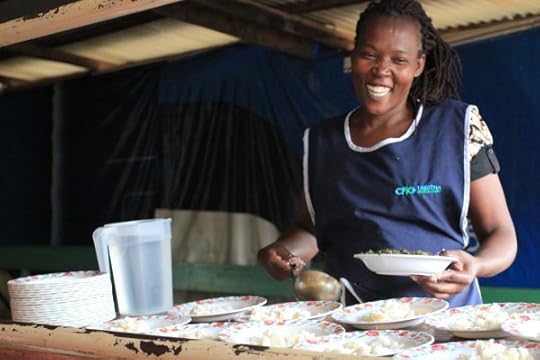 The Lishe Bora Mtaani Nutrition Centre responded to rising food insecurity by providing families with food packages throughout the pandemic.
The Lishe Bora Mtaani Nutrition Centre responded to rising food insecurity by providing families with food packages throughout the pandemic.  CFK purchased and began operating its first-ever ambulance in Kibera.
CFK purchased and began operating its first-ever ambulance in Kibera.jQuery(document).ready(function ($) {
if( typeof jQuery('.ult-carousel-41606202445feaeca86f25e').slick == "function"){
$('.ult-carousel-41606202445feaeca86f25e').slick({dots: false,autoplay: true,autoplaySpeed: 5000,speed: 300,infinite: true,arrows: true,nextArrow: '<button type="button" role="button" aria-label="Next" style="color:#333333; font-size:20px;" class="slick-next default"><i class="ultsl-arrow-right4"></i></button>',prevArrow: '<button type="button" role="button" aria-label="Previous" style="color:#333333; font-size:20px;" class="slick-prev default"><i class="ultsl-arrow-left4"></i></button>',slidesToScroll:1,slidesToShow:1,swipe: true,draggable: true,touchMove: true,pauseOnHover: true,pauseOnFocus: false,responsive: [
{
breakpoint: 1026,
settings: {
slidesToShow: 1,
slidesToScroll: 1,
}
},
{
breakpoint: 1025,
settings: {
slidesToShow: 1,
slidesToScroll: 1
}
},
{
breakpoint: 760,
settings: {
slidesToShow: 1,
slidesToScroll: 1
}
}
],pauseOnDotsHover: true,customPaging: function(slider, i) {
return '<i type="button" style= "color:#333333;" class="ultsl-record" data-role="none"></i>';
},});
}
});
Education & Livelihoods
Government-mandated lockdowns and school closures forced millions of students out of class in early 2020. Many students in Kibera lacked access to online learning resources or distance learning opportunities, which threatened to increase the education gap across socioeconomic levels. To address this growing need, CFK’s Education and Livelihoods Program developed a home-learning initiative.
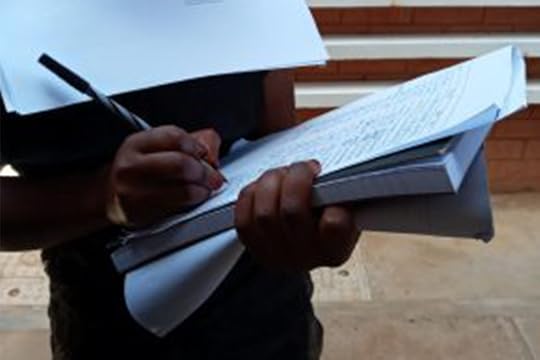 Since the start of the COVID-19 pandemic, CFK has provided more than 10,000 revision materials to over 600 students in Kibera.
Since the start of the COVID-19 pandemic, CFK has provided more than 10,000 revision materials to over 600 students in Kibera.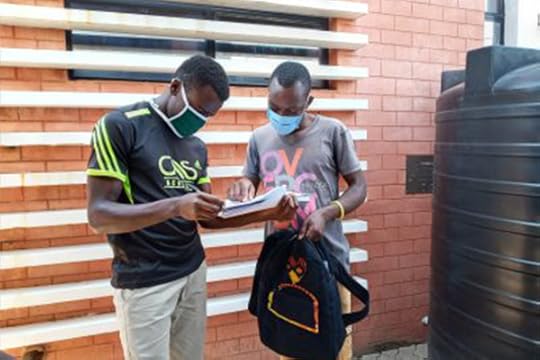 Many young alumni from our Education and Livelihoods Program supported current students by distributing and answering questions about CFK revision materials.
Many young alumni from our Education and Livelihoods Program supported current students by distributing and answering questions about CFK revision materials.  100% of our 2019 Angaza Scholarship graduates are continuing their educations at local universities and colleges.
100% of our 2019 Angaza Scholarship graduates are continuing their educations at local universities and colleges. 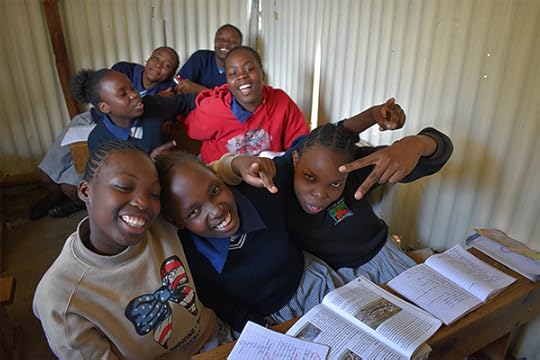 The Best Schools Initiative (BSI) completed its pilot phase this year and found that seven of its best practices were significantly correlated with increased student attendance and academic progress.
The Best Schools Initiative (BSI) completed its pilot phase this year and found that seven of its best practices were significantly correlated with increased student attendance and academic progress. The BSI hopes to continue expanding its work when schools re-open in 2021. Program staff have worked closely with schools to identify their greatest needs before they re-open in January.
The BSI hopes to continue expanding its work when schools re-open in 2021. Program staff have worked closely with schools to identify their greatest needs before they re-open in January. jQuery(document).ready(function ($) {
if( typeof jQuery('.ult-carousel-1810564195feaeca872d21').slick == "function"){
$('.ult-carousel-1810564195feaeca872d21').slick({dots: false,autoplay: true,autoplaySpeed: 5000,speed: 300,infinite: true,arrows: true,nextArrow: '<button type="button" role="button" aria-label="Next" style="color:#333333; font-size:20px;" class="slick-next default"><i class="ultsl-arrow-right4"></i></button>',prevArrow: '<button type="button" role="button" aria-label="Previous" style="color:#333333; font-size:20px;" class="slick-prev default"><i class="ultsl-arrow-left4"></i></button>',slidesToScroll:1,slidesToShow:1,swipe: true,draggable: true,touchMove: true,pauseOnHover: true,pauseOnFocus: false,responsive: [
{
breakpoint: 1026,
settings: {
slidesToShow: 1,
slidesToScroll: 1,
}
},
{
breakpoint: 1025,
settings: {
slidesToShow: 1,
slidesToScroll: 1
}
},
{
breakpoint: 760,
settings: {
slidesToShow: 1,
slidesToScroll: 1
}
}
],pauseOnDotsHover: true,customPaging: function(slider, i) {
return '<i type="button" style= "color:#333333;" class="ultsl-record" data-role="none"></i>';
},});
}
});
Girls Empowerment
The COVID-19 pandemic has exacerbated existing inequalities, leaving adolescent girls and young women at greater risk of teenage pregnancy and sexual and gender-based violence (SGBV). CFK’s Girls Empowerment Program has responded through a dual strategy of mentorship and advocacy, meeting girls’ financial and psychosocial needs.
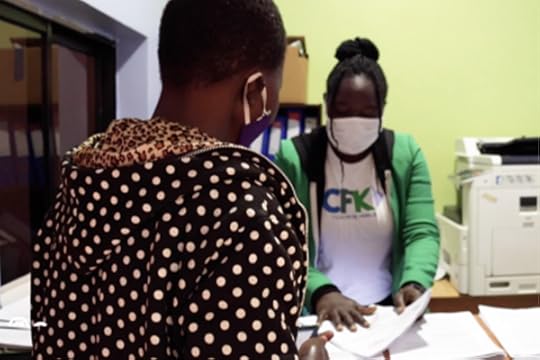 CFK has continued to support girls by continuing mentorship sessions over the phone and at safe social distances.
CFK has continued to support girls by continuing mentorship sessions over the phone and at safe social distances.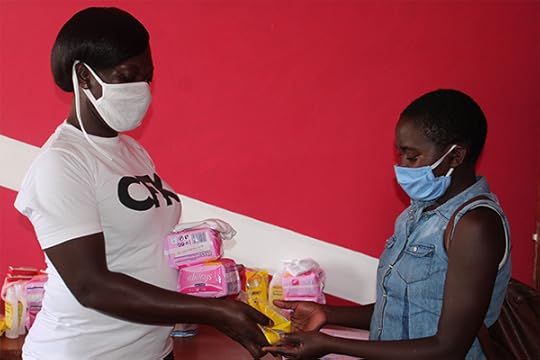 Staff have also distributed Dignity Kits to girls to alleviate some financial pressures for young women. The kits include soap, sanitizer, underwear, and feminine hygiene products.
Staff have also distributed Dignity Kits to girls to alleviate some financial pressures for young women. The kits include soap, sanitizer, underwear, and feminine hygiene products. 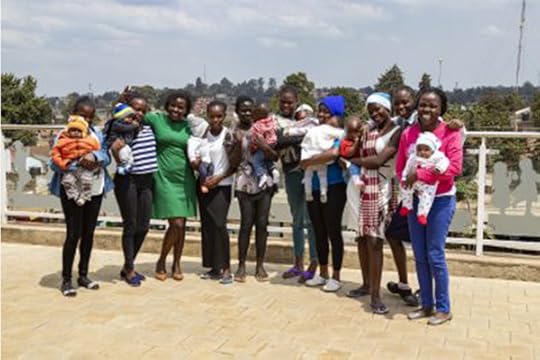 CFK's Funzo initiative helped re-enroll 401 teenage mothers in school and engaged 42 schools in Memorandums of Understanding on the treatment and acceptance of teenage mothers in the classoom.
CFK's Funzo initiative helped re-enroll 401 teenage mothers in school and engaged 42 schools in Memorandums of Understanding on the treatment and acceptance of teenage mothers in the classoom.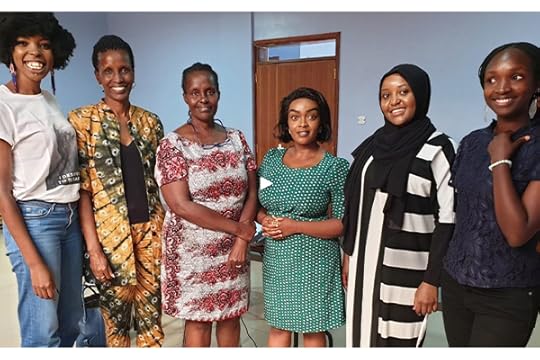 This year, CFK worked with the Adelle Onyango Initiative to help develop Safe 24/7, a project providing long-term group therapy to survivors of SGBV.
This year, CFK worked with the Adelle Onyango Initiative to help develop Safe 24/7, a project providing long-term group therapy to survivors of SGBV. jQuery(document).ready(function ($) {
if( typeof jQuery('.ult-carousel-9704941195feaeca874b39').slick == "function"){
$('.ult-carousel-9704941195feaeca874b39').slick({dots: false,autoplay: true,autoplaySpeed: 5000,speed: 300,infinite: true,arrows: true,nextArrow: '<button type="button" role="button" aria-label="Next" style="color:#333333; font-size:20px;" class="slick-next default"><i class="ultsl-arrow-right4"></i></button>',prevArrow: '<button type="button" role="button" aria-label="Previous" style="color:#333333; font-size:20px;" class="slick-prev default"><i class="ultsl-arrow-left4"></i></button>',slidesToScroll:1,slidesToShow:1,swipe: true,draggable: true,touchMove: true,pauseOnHover: true,pauseOnFocus: false,responsive: [
{
breakpoint: 1026,
settings: {
slidesToShow: 1,
slidesToScroll: 1,
}
},
{
breakpoint: 1025,
settings: {
slidesToShow: 1,
slidesToScroll: 1
}
},
{
breakpoint: 760,
settings: {
slidesToShow: 1,
slidesToScroll: 1
}
}
],pauseOnDotsHover: true,customPaging: function(slider, i) {
return '<i type="button" style= "color:#333333;" class="ultsl-record" data-role="none"></i>';
},});
}
});
Leadership
This year, CFK expanded its national and international partnerships and influence. Executive Director, Hillary Omala, served on several government committees and subcommittees, contributing to the national strategy on COVID-19 response and communicating the unique challenges of informal settlements.
CFK also convened a new Advisory Council, composed of 14 international leaders, which will help guide CFK’s continued growth and impact.
In 2021, CFK will enter a signal moment as an organization as it begins executing a new strategic plan and expanding its programs and models to additional informal settlements in Kenya.
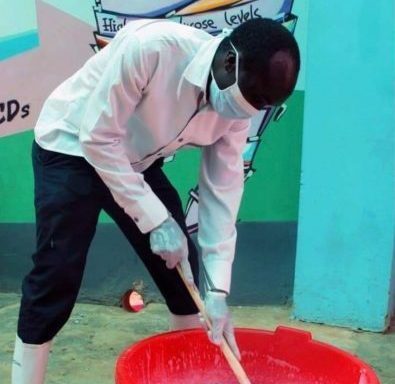 CFK Executive Director Hillary Omala making soap in Kibera.
CFK Executive Director Hillary Omala making soap in Kibera.Learn more about our programs and help drive our growth.
Stories of Progress
 2020 Year in Review: Our Work in PicturesIn 2020, CFK expanded its impact in Kibera, responded to emergency needs created by the COVID-19 pandemic, and celebrated milestones across its programs. Moving forward, CFK seeks to expand its programs and services to additional informal settlements in Kenya.by Hannah Bain
2020 Year in Review: Our Work in PicturesIn 2020, CFK expanded its impact in Kibera, responded to emergency needs created by the COVID-19 pandemic, and celebrated milestones across its programs. Moving forward, CFK seeks to expand its programs and services to additional informal settlements in Kenya.by Hannah Bain
 Empowering Girls & Creating Sustainable ImpactRaised in an informal settlement, Sarah Waithera has always been acutely aware of the challenges girls face in disenfranchised communities. Understanding first-hand the threat of gender inequality, she made it her personal mission to work with and empower young girls.by Hannah Bain
Empowering Girls & Creating Sustainable ImpactRaised in an informal settlement, Sarah Waithera has always been acutely aware of the challenges girls face in disenfranchised communities. Understanding first-hand the threat of gender inequality, she made it her personal mission to work with and empower young girls.by Hannah Bain
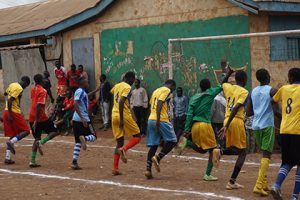 Coaching Sports & Teaching LeadershipCFK's flagship Sports for Development Project was founded in 2001 to promote peace and reduce ethnic violence. While the project shifted its approach in 2018, its core belief remains the same: sports can do much more than provide entertainment and physical activity. by Hannah BainRead more stories
Coaching Sports & Teaching LeadershipCFK's flagship Sports for Development Project was founded in 2001 to promote peace and reduce ethnic violence. While the project shifted its approach in 2018, its core belief remains the same: sports can do much more than provide entertainment and physical activity. by Hannah BainRead more storiesThe post 2020 Year in Review: Our Work in Pictures appeared first on Carolina for Kibera.
December 20, 2020
Empowering Girls & Creating Sustainable Impact
Raised in an informal settlement with three sisters, Sarah Waithera has always been acutely aware of the challenges girls face in disenfranchised communities. Understanding first-hand the threat of gender inequality, she made it her personal mission to work with and empower young girls.
When a position opened in CFK’s Girls Empowerment Program (GEP) in 2008, Sarah walked into the office and requested an application. Initially hired as an Assistant Program Officer, Sarah and now serves as the GEP’s Program Coordinator.
“I have not been stuck in one position,” Sarah said. “Working at CFK has built me individually and given me the opportunity for personal growth. Before starting with CFK, I had a college-level diploma, but now I have a university degree and am participating in another course. The organization gives me the time to balance my studies and my work, allowing me to become a more informed and effective leader.”
In her current position, Sarah refers girls to additional resources, meets with GEP mentors for updates on safe space sessions, writes reports on the program, conducts parent meetings, and participates in home and school visits. Though Sarah leads the program, she has not lost her zeal for working directly with the girls.
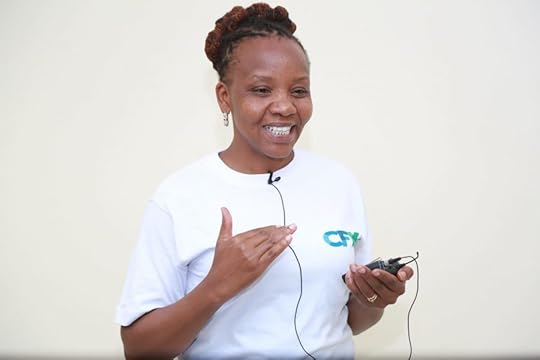 Girls Empowerment Program Coordinator, Sarah Waithera, speaks to a group at CFK's Binti Pamoja Centre.
Girls Empowerment Program Coordinator, Sarah Waithera, speaks to a group at CFK's Binti Pamoja Centre.One girl approached Sarah because she wasn’t sure if she wanted to attend high school or vocational school. She ultimately decided to pursue catering school because she wanted to develop hands-on skills, and Sarah later helped connect her to job opportunities.
“She eventually finished an internship and got a job, which is a big milestone,” Sarah said. “Now, she can support her child and her family with a stable salary.”
Tubonge – “Let’s Talk”
Though CFK is not the only organization providing a girl-centered program in Kibera, Sarah believes that her team’s approach is unique.
“We give girls the opportunity to socialize, bond, and talk about any issues affecting them, but we also have many approaches for those who do not want to share their experiences out loud.”
One of these non-verbal approaches is the talking box, referred to as Tubonge (Swahili for “Let’s talk”). It operates like a suggestion box, inviting girls to anonymously share their experiences and apprehensions and ask questions in writing.
 The Girls Empowerment Program's "Let's Talk" box where girls can share their experiences and ask questions anonymously.
The Girls Empowerment Program's "Let's Talk" box where girls can share their experiences and ask questions anonymously. “Girls can write and will write more because they do not have to say it out loud,” Sarah noted. “The girls are much more open when they can share anonymously.”
Empowered by the talking box, one girl wrote about her struggles as a teenage mother, sharing that she was experiencing issues with her in-laws and unable to pay for her school fees. Before she decided to share through the talking box, none of the staff knew that she was a teenage mother. Fortunately, this young mother decided to sign her name to her talking box slip, allowing the GEP to follow-up with her and help support her efforts to get back into school.
Managing Expectations & Creating Sustainable Impact
While Sarah enjoys supporting young girls in need, she also recognizes the need for setting boundaries so the GEP can continue to grow sustainably.
“Sometimes expectations can be too high, and we do not want to foster a cycle of dependency,” Sarah said. “We want to support the community, but we also want parents, students, and community members to take initiative and responsibility.”
Rooted in Kibera for nearly 20 years, CFK has worked with the community to generate sustainable impact and develop responsible, effective interventions.
“When we want to introduce a new program, we reach out to the community and ask them what they think,” Sarah said, emphasizing CFK’s commitment to participatory development.
While CFK is making progress in managing expectations and empowering community members, external factors such as political instability, gender inequality, sexual and gender-based violence (SGBV), and limited funding also pose challenges for large-scale progress.
Adapting to COVID-19
Public health challenges such as the COVID-19 pandemic also continue to disproportionately impact vulnerable demographics, including girls in high-poverty communities. In addition to living in an overcrowded informal settlement with poor sanitation, girls in Kibera suffer from limited educational and economic opportunities and high rates of teenage based pregnancy and SGBV.
Coronavirus-related lockdowns, school closures, and heightened financial struggles have exacerbated the challenges these girls already face.
Additionally, many estimate that teenage pregnancies and rates of SGBV will increase during the pandemic. The GEP has experienced this trend first-hand. Pre-pandemic, the program recorded two to three teenage pregnancies per month on average. During October, it recorded 14.
While the GEP has suspended its in-person group activities, it continues to provide support for girls in the community by conducting mentorship sessions over the phone, offering free health check-ups and coronavirus testing, installing handwashing stations, and providing girls with hygiene kits, which include underwear, soap, sanitizer, and sanitary towels. The program has also continued identifying teenage mothers, referring them to resources, and providing them with emergency support.
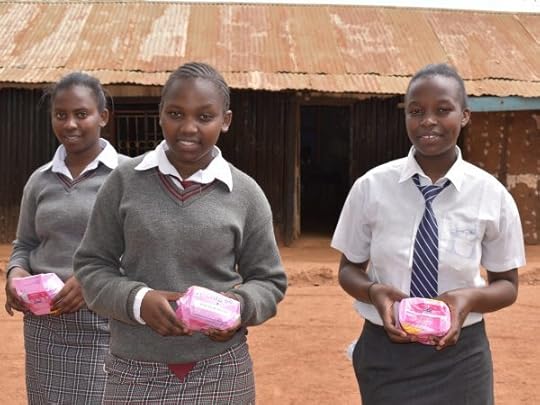 Participants of CFK's Girls Empowerment Program receive hygiene supplies.
Participants of CFK's Girls Empowerment Program receive hygiene supplies.Reducing Rates of Sexual and Gender-based Violence
As CFK prepares to enter a pivotal moment as an organization in 2021, Sarah hopes to expand the GEP’s work to mitigate SGBV and achieve justice for more survivors.
“Right now, there is a lack of understanding about the magnitude of SGBV; many people still do not recognize it as illegal,” Sarah said. “There is also a lack of consensus on what support to provide for survivors and what consequences to enforce for perpetrators. We hope to address this by taking a holistic approach and sensitizing the entire community – from matatu drivers to the local administration – on the issue of SGBV.”
Sarah also hopes to help develop widely accepted paths to achieve justice for survivors, many of which are left with no counseling or support. In Kibera, few victims of SGBV report the crime to the necessary authorities. Those that do often have their case dropped due to bribes or other pressures.
“The community already feels ownership over CFK, and we want to take this work to the next level,” Sarah said. “We believe informing the community will empower them to take action and join us in the effort to reduce teenage pregnancy and rates of SGBV in Kibera and beyond.”
Learn more about the Girls Empowerment Program, and consider supporting CFK to help us expand our work with girls in Kibera.
Stories of Progress
 Empowering Girls & Creating Sustainable ImpactRaised in an informal settlement, Sarah Waithera has always been acutely aware of the challenges girls face in disenfranchised communities. Understanding first-hand the threat of gender inequality, she made it her personal mission to work with and empower young girls.by Hannah Bain
Empowering Girls & Creating Sustainable ImpactRaised in an informal settlement, Sarah Waithera has always been acutely aware of the challenges girls face in disenfranchised communities. Understanding first-hand the threat of gender inequality, she made it her personal mission to work with and empower young girls.by Hannah Bain
 Coaching Sports & Teaching LeadershipCFK's flagship Sports for Development Project was founded in 2001 to promote peace and reduce ethnic violence. While the project shifted its approach in 2018, its core belief remains the same: sports can do much more than provide entertainment and physical activity. by Hannah Bain
Coaching Sports & Teaching LeadershipCFK's flagship Sports for Development Project was founded in 2001 to promote peace and reduce ethnic violence. While the project shifted its approach in 2018, its core belief remains the same: sports can do much more than provide entertainment and physical activity. by Hannah Bain
 The Power of Economic OpportunityBramwell connected with CFK’s entrepreneurship and economic development initiative in 2019. Now, he has a full-time job and is continuing his education, paying off his school fees, and helping support his friends and family. by Hannah BainRead more stories
The Power of Economic OpportunityBramwell connected with CFK’s entrepreneurship and economic development initiative in 2019. Now, he has a full-time job and is continuing his education, paying off his school fees, and helping support his friends and family. by Hannah BainRead more storiesThe post Empowering Girls & Creating Sustainable Impact appeared first on Carolina for Kibera.
December 16, 2020
Coaching Sports & Teaching Leadership
CFK’s flagship Sports for Development initiative began in 2001 as an effort to promote peace and reduce ethnic violence in Kibera. Organizing community leagues and tournaments, CFK required each team to be ethnically diverse, and teams earned additional points to improve their league standing by participating in community service activities.
While the project shifted its approach in 2018, its core belief remains the same: sports can do much more than provide entertainment and physical activity.
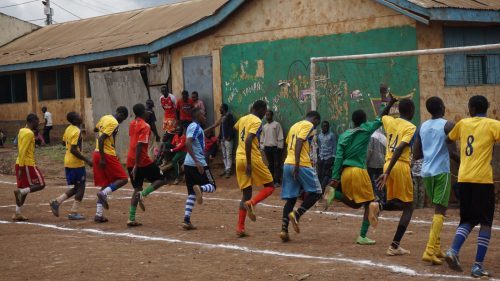 A team participates in CFK's Sports for Development Project.
A team participates in CFK's Sports for Development Project.Kennedy Juma, the Sports for Development Program Officer, joined CFK in 2004 and has focused on adding value to the project. The initiative now implements a Value-Based Sports (VBS) approach, leading players through sports drills and then participatory sessions on drug and substance abuse, crime and violence prevention, and sexual and gender-based violence (SGBV).
“This is not a sports project where students show up, play, and then go home,” Kennedy said. “We take young people and their coaches on a journey where they develop leadership skills, discuss social issues, and learn to appreciate people regardless of their background.”
In addition to providing youth with the opportunity to play and compete, the Sports for Development project involves parents, organizes leadership trainings, and hosts forums to keep young people engaged and monitor progress in the community.
Learning On and Off the Pitch
The Sports for Development project still organizes tournaments, but now it works more closely with schools throughout the community to ensure that “students become learners both in the classroom and on the football pitch.”
As part of the larger Education and Livelihoods program, the sports project has access to partner schools and will take sessions directly to the schools when classes resume normally.
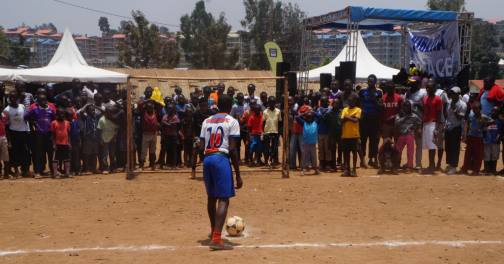 A football player prepares to take a penalty kick during a game hosted by CFK.
A football player prepares to take a penalty kick during a game hosted by CFK.The project also offers “Better Breaks Sports” when schools are not in session, providing young people with a constructive, enjoyable way to spend their free time.
CFK projects do not work in silos; they complement one another and create a web of interconnected initiatives meeting diverse physical and mental health, education, economic, and development needs.
On the field, Kennedy and his team focus on shaping talent and building teamwork. Off the field, they connect youth to CFK resources such as the Entrepreneurship and Economic Development initiative, where youth can develop academically and professionally.
“Sports might be the entry point [to CFK] for many young people in the community, but they get so much more out of it and really excel when they involve themselves in our other programs and projects,” Kennedy said.
Learn more about CFK’s Sports for Development project and Education and Livelihoods program.
Stories of Progress
 Coaching Sports & Teaching LeadershipCFK's flagship Sports for Development Project was founded in 2001 to promote peace and reduce ethnic violence. While the project shifted its approach in 2018, its core belief remains the same: sports can do much more than provide entertainment and physical activity. by Hannah Bain
Coaching Sports & Teaching LeadershipCFK's flagship Sports for Development Project was founded in 2001 to promote peace and reduce ethnic violence. While the project shifted its approach in 2018, its core belief remains the same: sports can do much more than provide entertainment and physical activity. by Hannah Bain
 The Power of Economic OpportunityBramwell connected with CFK’s entrepreneurship and economic development initiative in 2019. Now, he has a full-time job and is continuing his education, paying off his school fees, and helping support his friends and family. by Hannah Bain
The Power of Economic OpportunityBramwell connected with CFK’s entrepreneurship and economic development initiative in 2019. Now, he has a full-time job and is continuing his education, paying off his school fees, and helping support his friends and family. by Hannah Bain
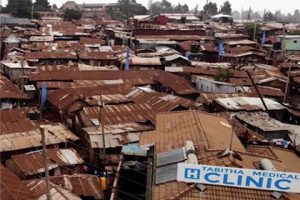 The Impact of COVID-19 on SGBV in KiberaFueled by a combination of confined living conditions, economic insecurity, and food insecurity, there has been an alarming increase in physical, psychological, sexual, and economic forms of domestic violence against women and girls in Kibera.by Carolina for KiberaRead more stories
The Impact of COVID-19 on SGBV in KiberaFueled by a combination of confined living conditions, economic insecurity, and food insecurity, there has been an alarming increase in physical, psychological, sexual, and economic forms of domestic violence against women and girls in Kibera.by Carolina for KiberaRead more storiesThe post Coaching Sports & Teaching Leadership appeared first on Carolina for Kibera.
December 15, 2020
The Power of Economic Opportunity
Talent is universal, but opportunity is not. Young people like Bramwell, an alumnus of CFK’s Entrepreneurship and Economic Development (EED) initiative, are proof of that.
Bramwell connected with CFK’s EED initiative in 2019. Now, only one year later, he has a full-time job and is continuing his education, paying off his school fees, supporting some of his relatives, and helping a few of his friends with their school fees.
CFK’s EED project builds capacity among young people through various work readiness and skills trainings, interview and CV preparation, and guidance on topics such as negotiation and diversity.
 Students learn at CFK's ICT Centre in Kibera.
Students learn at CFK's ICT Centre in Kibera.“I learned a lot in [CFK’s] capacity building training,” Bramwell said. “Professionally, I learned how to prepare myself for an interview and how to communicate with my colleagues, clients, and employers. Personally, I learned how to support myself on matters of savings, time management, planning for future goals, and managing my budget on a monthly basis.”
With an estimated 80% of youth in Kibera unemployed, the EED project also encourages young people to form youth savings and loan organizations. These groups foster a saving culture among younger generations and help them access resources to run their own enterprises.
“Not everyone can be involved in the formal market, so developing financial literacy and a saving culture among young people is critical,” said Dalton Odhiambo, the Program Officer leading CFK’s ICT initiative.
Moving Beyond Capacity Building
Following capacity building workshops, CFK connects young people to organizations based on their interests and skills.
After completing the EED’s capacity building training, Bramwell got connected to a second training with Generation Kenya, where he learned about financial services. He hopes to pursue a career as a financial advisor to meet growing needs in his community.
“In the community I come from, we don’t have a culture where we know how to take control of money,” Bramwell explained. “Saving skills are lacking, so I would like to advise [members of my community], support them, and teach them how to save.”
Bramwell currently works full-time in customer service with Safaricom, one of the leading communications companies in Kenya.
“I love going to work knowing that I have the skills required to do my work,” he said. “I want to thank CFK for their support and for everything they are doing in the community.”
As an alumnus of the EED project, Bramwell stays in touch with Dalton, who has served as one of his trainers and mentors over the last year. He also advises some participants of the current cohort, sharing his experiences and encouraging them to continue setting ambitious goals.
Dalton hopes to expand alumni engagement within the EED initiative moving forward. He has already identified five young alumni who will share their experiences with EED participants in 2021.
Learn more about the EED project, and see what your support can do for young people like Bramwell.
Stories of Progress
 The Power of Economic OpportunityBramwell connected with CFK’s entrepreneurship and economic development initiative in 2019. Now, he has a full-time job and is continuing his education, paying off his school fees, and helping support his friends and family. by Hannah Bain
The Power of Economic OpportunityBramwell connected with CFK’s entrepreneurship and economic development initiative in 2019. Now, he has a full-time job and is continuing his education, paying off his school fees, and helping support his friends and family. by Hannah Bain
 The Impact of COVID-19 on SGBV in KiberaFueled by a combination of confined living conditions, economic insecurity, and food insecurity, there has been an alarming increase in physical, psychological, sexual, and economic forms of domestic violence against women and girls in Kibera.by Carolina for Kibera
The Impact of COVID-19 on SGBV in KiberaFueled by a combination of confined living conditions, economic insecurity, and food insecurity, there has been an alarming increase in physical, psychological, sexual, and economic forms of domestic violence against women and girls in Kibera.by Carolina for Kibera
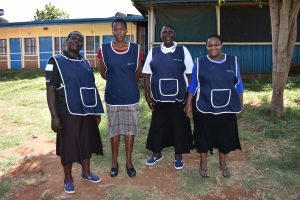 From the Field: A Day in the Life of a Community Health VolunteerLiving in Kibera for many years, Bentado, one of the Community Health Volunteers (CHVs) working out of CFK’s Lishe Bora Mtaani Nutrition Centre, has experienced firsthand the health challenges facing the community. Now, she has become part of the solution. by Hannah BainRead more stories
From the Field: A Day in the Life of a Community Health VolunteerLiving in Kibera for many years, Bentado, one of the Community Health Volunteers (CHVs) working out of CFK’s Lishe Bora Mtaani Nutrition Centre, has experienced firsthand the health challenges facing the community. Now, she has become part of the solution. by Hannah BainRead more storiesThe post The Power of Economic Opportunity appeared first on Carolina for Kibera.
December 10, 2020
The Impact of COVID-19 on SGBV in Kibera
Disclaimer: This post contains information about sexual and gender-based violence. If you feel unsafe, have been harmed, or feel threatened, intimidated, or harassed, seek support at CFK #usinyamaze toa sauti.
The World Health Organization (WHO) declared the COVID-19 outbreak a global pandemic in March 2020. As a result, countries around the world implemented various quarantine measures, economic insecurity and unemployment rates soared, and concerns surrounding domestic violence and other forms of sexual and gender-based violence (SGBV) escalated.
Fueled by a combination of confined living conditions, economic insecurity, and food insecurity, there has been an alarming increase in physical, psychological, sexual, and economic forms of domestic violence against women and girls in Kibera and across Kenya.
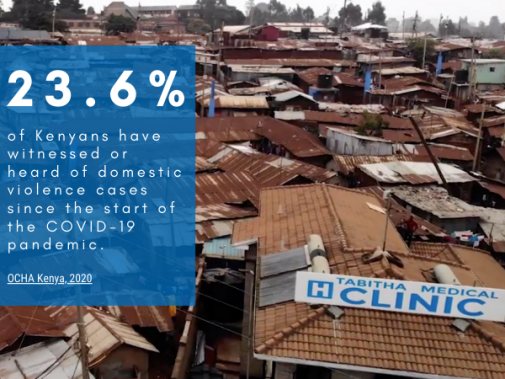
Since the start of the pandemic, CFK has received reports of women in Kibera being abused by their husbands due to a lack of food and power to provide for the family. Additionally, teenage pregnancies have escalated during the pandemic, and we have learned of instances of sexual assault committed by male neighbors against teenage girls.
School Closures, Food Insecurity & SGBV
Schools typically serve as ‘safe spaces’ for children in the community. Some schools also offer lunches, alleviating some of the food insecurity that many families in Kibera face. Unfortunately, due to government-mandated school closures, thousands of students cannot attend class, and many have lost access to school feeding programs.
Girls suddenly find themselves home all day, frequently with no caregivers around, and struggle to find work to provide for themselves or their families. This increased food insecurity and financial stress have forced some into unhealthy, manipulative relationships.
CFK’s Support for Survivors
CFK is committed to sensitizing the community on SGBV and supporting and achieving justice for survivors of SGBV. Our team provides critical medical care and mental health support for survivors, connects them to resources such as safe houses, and works with other local organizations to help survivors pursue legal action if they desire.
As the COVID-19 pandemic continues to exacerbate the vulnerabilities of girls and women in informal settlements, we must work together to identify, address, and end cases of SGBV.
If you or someone you know has experienced SGBV or feel at risk of SGBV, you are not alone and it is not your fault. Contact CFK for support.
Stories of Progress
 The Impact of COVID-19 on SGBV in KiberaFueled by a combination of confined living conditions, economic insecurity, and food insecurity, there has been an alarming increase in physical, psychological, sexual, and economic forms of domestic violence against women and girls in Kibera.by Carolina for Kibera
The Impact of COVID-19 on SGBV in KiberaFueled by a combination of confined living conditions, economic insecurity, and food insecurity, there has been an alarming increase in physical, psychological, sexual, and economic forms of domestic violence against women and girls in Kibera.by Carolina for Kibera
 From the Field: A Day in the Life of a Community Health VolunteerLiving in Kibera for many years, Bentado, one of the Community Health Volunteers (CHVs) working out of CFK’s Lishe Bora Mtaani Nutrition Centre, has experienced firsthand the health challenges facing the community. Now, she has become part of the solution. by Hannah Bain
From the Field: A Day in the Life of a Community Health VolunteerLiving in Kibera for many years, Bentado, one of the Community Health Volunteers (CHVs) working out of CFK’s Lishe Bora Mtaani Nutrition Centre, has experienced firsthand the health challenges facing the community. Now, she has become part of the solution. by Hannah Bain
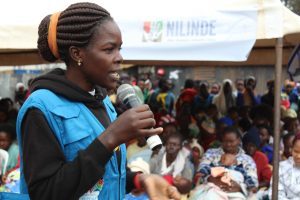 Working Together to Address SGBV in KiberaWorldwide, 1 in 3 women experience sexual and gender-based violence (SGBV) in their lifetime. In Kibera, that statistic is likely higher, but CFK is empowering girls, mobilizing the community, and helping create a path to justice for survivors.by Hannah BainRead more stories
Working Together to Address SGBV in KiberaWorldwide, 1 in 3 women experience sexual and gender-based violence (SGBV) in their lifetime. In Kibera, that statistic is likely higher, but CFK is empowering girls, mobilizing the community, and helping create a path to justice for survivors.by Hannah BainRead more storiesThe post The Impact of COVID-19 on SGBV in Kibera appeared first on Carolina for Kibera.
December 8, 2020
From the Field: A Day in the Life of a Community Health Worker
Contributions by Bentado | Written by Hannah Bain
In Kenya, approximately one out of four children under the age of five suffer from malnutrition. The triple threat of food insecurity, inadequate care at the household level, and limited access to healthcare in Kibera exacerbates this acute public health issue, requiring a multi-level response including malnutrition treatment, community education, and one-on-one nutrition support.
Living in Kibera for many years, Bentado, a Community Health Worker (CHW) working out of CFK’s Lishe Bora Mtaani Nutrition Centre, has experienced firsthand the health challenges facing the community. Now, she has become part of the solution.
 Children enjoy a meal at CFK's Lishe Bora Mtaani Nutrition Centre.
Children enjoy a meal at CFK's Lishe Bora Mtaani Nutrition Centre. CHWs and Community Health Volunteers (CHVs) are critical to the implementation and success of CFK’s primary health program, including its nutrition services. In addition to identifying malnourished children in the community, they conduct follow-up visits to prevent relapse, provide one-on-one nutrition support, and teach caregivers how to improve their families’ nutrition without increasing their daily budgets.
From the FieldOn a typical day, CHWs and CHVs convene in the morning, share a cup of tea, and then go into the field. They travel door-to-door conducting follow-up visits, identifying new children or expecting mothers in need of support, and leading “health talks” with caregivers on topics such as handwashing and nutrition.
Though the nutrition centre focuses on supporting expecting mothers and malnourished children under five, CHWs and CHVs must be prepared to respond to diverse needs in the field.
“We tend to believe there is a child in almost every household,” Bentado said, referencing Kibera’s largely young population. “Sometimes, we have to care for the caregiver or act as the caregiver to make sure children in need have access to proper support and healthcare.”
One day, Bentado remembers working in the field and coming across a household with a child and no caregiver. Unwell and underweight, the child needed medical assistance, so Bentado and a team of CHVs took action. They asked neighbors for the caregiver’s contact information and arranged to meet them at the clinic to ensure that the child received critical care.
“It takes a lot of time to make those calls [and coordinate with caregivers],” Bentado said. “Sometimes the caregiver does not have money, so you have to dip into your own pockets or ask the neighbors to help support the child. My priority is making sure that these children live, so I will do whatever it takes.”
 Part of the team at CFK's Lishe Bora Mtaani Nutrition Centre One-on-One Nutrition Support
Part of the team at CFK's Lishe Bora Mtaani Nutrition Centre One-on-One Nutrition SupportBentado visits one household daily to monitor the health of a five-month-old child who gets limited attention from adult caregivers. Unable to eat anything, the child needed access to milk, so Bentado asked CFK to purchase the milk and then delivered five tins of it to the child’s brother.
She continues to visit the household every day to ensure the child receives necessary support and the caregivers understand the child’s needs.
“Many other nutrition services only have the means to provide food and supplements to families, but that does not mean that the families are using them in the correct way,” Bentado noted.
“Sometimes they have no cooking oil to make the porridge provided, and other times they don’t use the products as intended. CFK provides one-on-one nutrition support through CHWs and CHVs. If [caregivers] don’t know how to give their children the supplements, we show them how to.”
One day, Bentado remembers working in the field and coming across a household with a child and no caregiver. Unwell and underweight, the child needed medical assistance, so Bentado and a team of CHVs took action. They asked neighbors for the caregiver’s contact information and arranged to meet them at the clinic to ensure that the child received critical care.
“It takes a lot of time to make those calls [and coordinate with caregivers],” Bentado said. “Sometimes the caregiver does not have money, so you have to dip into your own pockets or ask the neighbors to help support the child. My priority is making sure that these children live, so I will do whatever it takes.”
Multiplying Community ImpactIn addition to field visits and personal nutrition support, CHWs and CHVs make appropriate referrals within CFK’s health program and lead training sessions with caregivers. Since it can be challenging to find and engage with many caregivers during the day, CHWs like Bentado often work into the early evening to connect with as many community members as possible.
Reaching just one caregiver in the community tends to have a multiplier effect. Those involved in the nutrition program often bring in other caregivers for trainings or refer their friends and family to the centre. Soon, they naturally build a network with their neighbors and friends, mobilizing community members to visit or make referrals to the nutrition centre when they come across malnourished children in the community.
Learn more about CFK’s nutrition centre and help support the work of our community health workers and community health volunteers.
Stories of Progress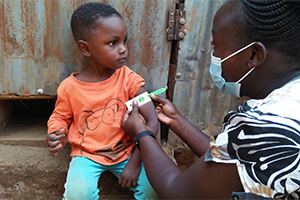 Championing Child Development through Nutrition and PlayDespite the challenges posed by the COVID-19 pandemic, Frankline Mwenda and his nutrition team have successfully cured and discharged 45 previously malnourished children during the pandemic. Now, they're continuing to respond to increased needs and expanding their impact in Kibera.
Championing Child Development through Nutrition and PlayDespite the challenges posed by the COVID-19 pandemic, Frankline Mwenda and his nutrition team have successfully cured and discharged 45 previously malnourished children during the pandemic. Now, they're continuing to respond to increased needs and expanding their impact in Kibera.
 Securing More than a ScholarshipWith her parents unable to financially support two children through secondary school, Nancy Muga had two options: wait for her brother to graduate or secure a scholarship for herself.
Securing More than a ScholarshipWith her parents unable to financially support two children through secondary school, Nancy Muga had two options: wait for her brother to graduate or secure a scholarship for herself.
 Promoting Healthy Decisions through Counseling and ConnectionsVictrine Oluoch was born to be a counselor. Growing up, she frequently offered advice to her friends, and, after serving as a peer mentor in high school, she recognized that her interest could lead to a purposeful career. Read more stories
Promoting Healthy Decisions through Counseling and ConnectionsVictrine Oluoch was born to be a counselor. Growing up, she frequently offered advice to her friends, and, after serving as a peer mentor in high school, she recognized that her interest could lead to a purposeful career. Read more storiesThe post From the Field: A Day in the Life of a Community Health Worker appeared first on Carolina for Kibera.
From the Field: A Day in the Life of a Community Health Volunteer
In Kenya, approximately one out of four children under the age of five suffer from malnutrition. The triple threat of food insecurity, inadequate care at the household level, and limited access to healthcare in Kibera exacerbates this acute public health issue, requiring a multi-level response including malnutrition treatment, community education, and one-on-one nutrition support.
Living in Kibera for many years, Bentado, one of the Community Health Volunteers (CHVs) working out of CFK’s Lishe Bora Mtaani Nutrition Centre, has experienced firsthand the health challenges facing the community. Now, she has become part of the solution.
 Children enjoy a meal at CFK's Lishe Bora Mtaani Nutrition Centre.
Children enjoy a meal at CFK's Lishe Bora Mtaani Nutrition Centre.CHVs are critical to the implementation and success of CFK’s primary health program, including its nutrition services. In addition to identifying malnourished children in the community, they conduct follow-up visits to prevent relapse, provide one-on-one nutrition support, and teach caregivers how to improve their families’ nutrition without increasing their daily budgets.
From the Field
On a typical day, CHVs convene in the morning, share a cup of tea, and then go into the field. They travel door-to-door conducting follow-up visits, identifying new children or expecting mothers in need of support, and leading “health talks” with caregivers on topics such as handwashing and nutrition.
Though the nutrition centre focuses on supporting expecting mothers and malnourished children under five, CHVs must be prepared to respond to diverse needs in the field.
“We tend to believe there is a child in almost every household,” Bentado said, referencing Kibera’s largely young population. “Sometimes, we have to care for the caregiver or act as the caregiver to make sure children in need have access to proper support and healthcare.”
One day, Bentado remembers working in the field and coming across a household with a child and no caregiver. Unwell and underweight, the child neeeded medical assistance, so Bentado and a team of CHVs took action. They asked neighbors for the caregiver’s contact information and arranged to meet them at the clinic to ensure that the child received critical care.
“It takes a lot of time to make those calls [and coordinate with caregivers],” Bentado said. “Sometimes the caregiver does not have money, so you have to dip into your own pockets or ask the neighbors to help support the child. My priority is making sure that these children live, so I will do whatever it takes.”
 Part of the team at CFK's Lishe Bora Mtaani Nutrition Centre
Part of the team at CFK's Lishe Bora Mtaani Nutrition CentreOne-on-One Nutrition Support
Bentado visits one household daily to monitor the health of a five-month-old child who gets limited attention from adult caregivers. Unable to eat anything, the child needed access to milk, so Bentado asked CFK to purchase the milk and then delivered five tins of it to the child’s brother.
She continues to visit the household every day to ensure the child receives necessary support and the caregivers understand the child’s needs.
“Many other nutrition services only have the means to provide food and supplements to families, but that does not mean that the families are using them in the correct way,” Bentado noted.
“Sometimes they have no cooking oil to make the porridge provided, and other times they don’t use the products as intended. CFK provides one-on-one nutrition support through CHVs. If [caregivers] don’t know how to give their children the supplements, we show them how to.”
One day, Bentado remembers working in the field and coming across a household with a child and no caregiver. Unwell and underweight, the child needed medical assistance, so Bentado and a team of CHVs took action. They asked neighbors for the caregiver’s contact information and arranged to meet them at the clinic to ensure that the child received critical care.
“It takes a lot of time to make those calls [and coordinate with caregivers],” Bentado said. “Sometimes the caregiver does not have money, so you have to dip into your own pockets or ask the neighbors to help support the child. My priority is making sure that these children live, so I will do whatever it takes.”
Multiplying Community Impact
In addition to field visits and personal nutrition support, CHVs make appropriate referrals within CFK’s health program and lead training sessions with caregivers. Since it can be challenging to find and engage with many caregivers during the day, CHVs like Bentado often work into the early evening to connect with as many community members as possible.
Reaching just one caregiver in the community tends to have a multiplier effect. Those involved in the nutrition program often bring in other caregivers for trainings or refer their friends and family to the centre. Soon, they naturally build a network with their neighbors and friends, mobilizing community members to visit or make referrals to the nutrition centre when they come across malnourished children in the community.
Learn more about CFK’s nutrition centre and help support the work of our community health volunteers.
Stories of Progress
 From the Field: A Day in the Life of a Community Health VolunteerLiving in Kibera for many years, Bentado, one of the Community Health Volunteers (CHVs) working out of CFK’s Lishe Bora Mtaani Nutrition Centre, has experienced firsthand the health challenges facing the community. Now, she has become part of the solution. by Hannah Bain
From the Field: A Day in the Life of a Community Health VolunteerLiving in Kibera for many years, Bentado, one of the Community Health Volunteers (CHVs) working out of CFK’s Lishe Bora Mtaani Nutrition Centre, has experienced firsthand the health challenges facing the community. Now, she has become part of the solution. by Hannah Bain
 Working Together to Address SGBV in KiberaWorldwide, 1 in 3 women experience sexual and gender-based violence (SGBV) in their lifetime. In Kibera, that statistic is likely higher, but CFK is empowering girls, mobilizing the community, and helping create a path to justice for survivors.by Hannah Bain
Working Together to Address SGBV in KiberaWorldwide, 1 in 3 women experience sexual and gender-based violence (SGBV) in their lifetime. In Kibera, that statistic is likely higher, but CFK is empowering girls, mobilizing the community, and helping create a path to justice for survivors.by Hannah Bain
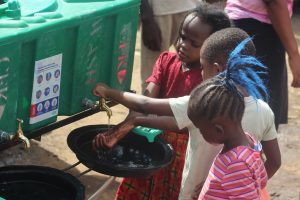 4 Reasons to Invest in CFK WASHWater, sanitation, and hygiene (WASH) initiatives are cost-effective ways to help save lives. CFK established its WASH project in 2014, targeting households with expecting mothers and children under five and seeking to reduce the cases of diarrheal diseases in the community.by Hannah BainRead more stories
4 Reasons to Invest in CFK WASHWater, sanitation, and hygiene (WASH) initiatives are cost-effective ways to help save lives. CFK established its WASH project in 2014, targeting households with expecting mothers and children under five and seeking to reduce the cases of diarrheal diseases in the community.by Hannah BainRead more storiesThe post From the Field: A Day in the Life of a Community Health Volunteer appeared first on Carolina for Kibera.
December 3, 2020
Working Together to Address SGBV in Kibera
According to the World Bank, 1 in 3 women worldwide experience sexual or gender-based violence (SGBV) in their lifetime. In Kenya, that statistic is even higher, with 45% of women and girls aged 15-49 experiencing some form of physical violence, and 14% experiencing sexual violence.
During this year’s 16 Days of Activism, CFK discussed the issue of SGBV with Susan, a Clinical Officer at Tabitha Medical Clinic who has experience working with survivors of SGBV. Employed by AMREF and working at the Tabitha Medical Clinic for the past year, Susan shared how economic and cultural factors influence SGBV and discussed interventions that can help address the issue.
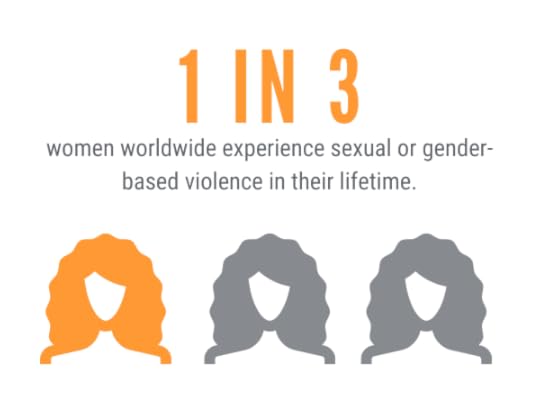
About SGBV and GBV
“Gender-based violence (GBV) is a harmful act directed at an individual based on their gender, and it undermines the health, security, and autonomy of survivors,” Susan explained.
Reducing SGBV requires a multi-pronged approach that includes empowering girls with accurate information, addressing violence against girls in school, providing information about the dangers of child marriage, mobilizing the community to value and protect girls, and educating boys and young men on women’s rights and sexual and reproductive health.
“The girls want to be heard and respected,” Susan said. “They want to make decisions for themselves, so it is important that we listen to their experiences, help them share their views, and give them accurate and critical information about health.”
Community Buy-in and Male Involvement
Though empowering girls and providing them with accurate information and support is part of the multi-faceted solution to SGBV, “it is also important to engage the community and get them on board to mitigate SGBV.” CFK includes community mobilization and male involvement strategies in its approach to the issue of SGBV.
For example, CFK’s Girls Empowerment Program (GEP) has partnered with schools to pilot boys-only safe spaces, where boys connect with male mentors, learn about women’s rights, and develop into advocates for girls in their community. The three schools that piloted the program have reported zero instances of teenage pregnancy and no cases of girls’ harassment.
Susan noted that strategies like these “instill a sense of responsibility in boys, so they treat girls like their own sisters.”
Child Marriage, Period Poverty, and SGBV
Changing community perceptions about women and girls will also help challenge harmful cultural norms such as child marriage.
Early marriages remain common in many Kenyan communities, and a national demographic and health survey found that nearly a quarter of girls in Kenya were married before their 18th birthday. Local myths about child marriage also fuel the high prevalence of the issue. For example, Susan shared that some communities believe that marrying a virgin can assist people battling HIV.
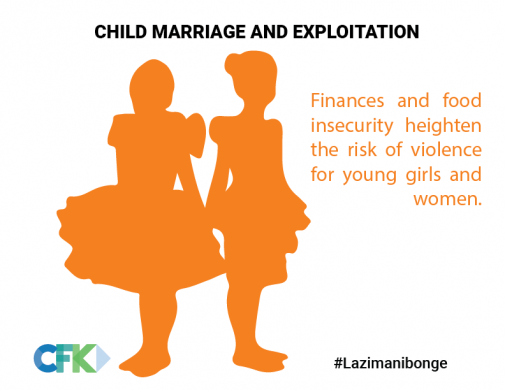
While cultural norms and widespread myths contribute to high rates of SGBV, poverty is the main challenge exacerbating the issue.
“When girls can’t afford basic needs such as food and water, they leave the house to fend for themselves or find someone who can help support them,” Susan said.
For example, period poverty is a significant issue affecting girls and young women in Kenya. An estimated 50-65% of girls in Kenya do not have access to sanitary products. This statistic is likely even higher for girls in Kibera, where the average resident lives on less than $2 per day. This lack of access causes many girls to miss school or engage in unhealthy practices such as sharing pads or trading sex for pads.
Trading sex for pads can expose vulnerable girls to a range of sexually transmitted infections and diseases and can also force them into dangerous and manipulative relationships, which often lead to instances of SGBV.
“A child can’t bargain for safe sex or report the matter if it happens,” Susan explained.
Barriers to Justice
Worldwide, only 40% of GBV survivors report the experience to someone, and less than 10% report cases to a “formal source” such as an authority. Even girls who do report instances of SGBV struggle to achieve justice. In Kenya, perpetrators of SGBV typically have more resources than victims, and they often bribe authorities to dismiss SGBV cases. This unjust practice further discourages survivors from reporting cases or seeking help.
“We need to challenge the culture of silence,” Susan noted. “Survivors of SGBV should know that we are never judging them; it is not their fault. They are not alone, and we will assist them in any way that we can. We offer counseling, provide medical support if needed, and make appropriate referrals to ensure they get the quality care that they need.”
Many non-governmental organizations (NGOs), including the Human Rights Watch, fear that the COVID-19 pandemic and related government lockdowns will lead to an increase in SGBV cases in Kenya and make it more difficult for girls to report cases. The combination of job losses, school closures, and curfews further limit girls’ already scarce access to sanitary products. Additionally, social, emotional, and physical support for survivors of SGBV may also be limited as many healthcare facilities focus on responding to the pandemic.
Creating a Path to Justice for Survivors
Achieving justice for survivors requires support from the entire community, including residents, authorities, and NGOs. Currently, the Kibera community engages with local chiefs and mobilizes young men to support and protect young girls. Community members also connect girls to safe houses where they can find shelter from abusive relationships.
In partnership with other local organizations, CFK provides direct support for survivors of SGBV, offering counseling and medical care and helping those who wish to report an SGBV case pursue legal action. The organization also works at the grassroots level to sensitize community members about women’s rights, sexual and reproductive health, and SGBV.
During the COVID-19 pandemic, CFK responded to increased economic challenges and fears about SGBV by providing Dignity Kits to girls. These packages include underwear, feminine hygiene products, soap, and sanitizer, saving girls an average of 389 KSH (~$3.89 USD) per month and mitigating the need for girls to engage in unsafe practices for sanitary products.
This year, CFK also expanded psychosocial support for survivors by collaborating on a new project. The GEP partnered with the Adelle Onyango Initiative to support the development of Safe 24/7, a project providing free, long-term trauma therapy for survivors of SGBV. When launched, the project will provide psychologist-led psychosocial support sessions for survivors and provide them with an opportunity to develop a sisterhood, connect to additional resources, and develop critical coping strategies.
Learn more about CFK’s support for young girls and find ways to engage in this year’s 16 Days of Activism.
Stories of Progress
 Working Together to Address SGBV in KiberaWorldwide, 1 in 3 women experience sexual and gender-based violence (SGBV) in their lifetime. In Kibera, that statistic is likely higher, but CFK is empowering girls, mobilizing the community, and helping create a path to justice for survivors.by Hannah Bain
Working Together to Address SGBV in KiberaWorldwide, 1 in 3 women experience sexual and gender-based violence (SGBV) in their lifetime. In Kibera, that statistic is likely higher, but CFK is empowering girls, mobilizing the community, and helping create a path to justice for survivors.by Hannah Bain
 4 Reasons to Invest in CFK WASHWater, sanitation, and hygiene (WASH) initiatives are cost-effective ways to help save lives. CFK established its WASH project in 2014, targeting households with expecting mothers and children under five and seeking to reduce the cases of diarrheal diseases in the community.by Hannah Bain
4 Reasons to Invest in CFK WASHWater, sanitation, and hygiene (WASH) initiatives are cost-effective ways to help save lives. CFK established its WASH project in 2014, targeting households with expecting mothers and children under five and seeking to reduce the cases of diarrheal diseases in the community.by Hannah Bain
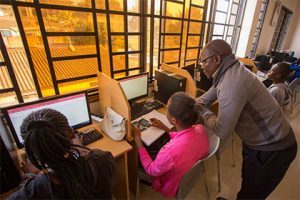 From Class to Coding: Angaza Alumnus Andrew Otieno OdongoAfter completing information and communications technology courses through CFK's entrepreneurship and economic development program, Andrew Otieno Odongo studied coding at the Moringa school and now works at a health-tech startup.by Carolina for KiberaRead more stories
From Class to Coding: Angaza Alumnus Andrew Otieno OdongoAfter completing information and communications technology courses through CFK's entrepreneurship and economic development program, Andrew Otieno Odongo studied coding at the Moringa school and now works at a health-tech startup.by Carolina for KiberaRead more storiesThe post Working Together to Address SGBV in Kibera appeared first on Carolina for Kibera.
Rye Barcott's Blog
- Rye Barcott's profile
- 7 followers



